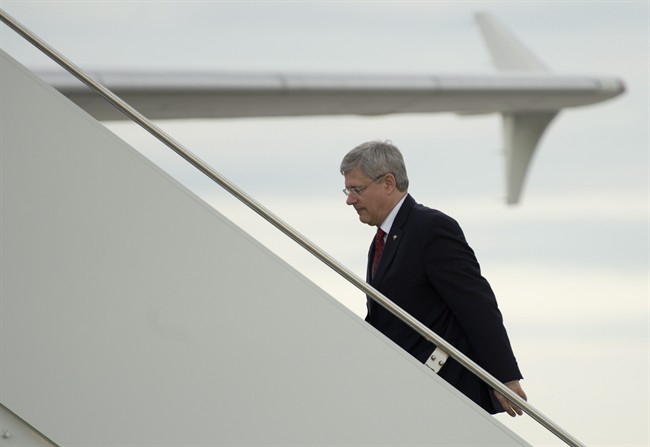ST. PETERSBURG, Russia – Canada is holding out little hope of reaching a compromise with Russia on the continuing violence and alleged use of chemical weapons in Syria, as Stephen Harper and fellow leaders began arriving Wednesday for the G20 summit.

A hastily organized meeting of foreign ministers on the sidelines appeared designed to keep the larger economic forum from getting completely swamped with talk of the political crisis.
But Foreign Affairs Minister John Baird threw cold water on the prospect of a larger consensus on how to respond to the alleged chemical attack launched against civilians two weeks ago in a Damascus suburb. Russian President and summit host Vladimir Putin has long backed the regime of Bashar Assad, and has warned that any strike against Syria without UN sanction would be in violation of international law.
“I think we hope that rational, sane people, freedom-loving people, people who abhor the use of these weapons, want to work collectively to ensure to the best of our ability that these weapons are not used again,” Baird told reporters travelling on Prime Minister Harper’s plane.
“(Russia) picked a lane in this battle years ago and I just don’t foresee it changing. This is the great issue we’re tackling, Russia’s great intractability to work with others on this issue. In some respects that’s the heart of the problem.”
U.S. President Barack Obama also expressed frustration Wednesday about Russia’s position. Speaking in Sweden on his way to the G20 summit, Obama said relations with Russia have “hit a wall,” but also expressed confidence that the two can work together on some issues.
Putin told The Associated Press and Russia’s state Channel 1 television in an interview late Tuesday that he wouldn’t rule out a strike against Syria as long as his government received “objective, precise data as to who committed” the chemical attack. He added that Moscow has provided some components of the S-300 air defence missile system to Syria but has frozen further shipments.
Baird downplayed the meeting of foreign ministers, calling it an “informal discussion on the margins of the G20.” Baird’s counterparts from the United States, Brazil, China, Russia and Turkey were expected to attend.
Read more: Obama challenges world on Syria strike
“The G20 is normally focused on economic issues, job creation, world economic growth,” Baird said.
“But obviously the crisis in Syria has become the biggest humanitarian challenge of this century and the escalation of the brutality of Assad’s regime against the Syrian people is of such great concern that obviously we need to take some time to discuss how to properly address it.”
This will be the first time in the G20’s five-year history that foreign ministers have met at the same time as leaders. Countries such as China and Russia have resisted any previous attempts to make it more than an economic forum.
Foreign ministers met under its auspices last year, but well before the actual summit took place in Los Cabos, Mexico. Russia, which insists on the primacy of the United Nations where it has a veto on the security council, participated with great reservations.
“Putin does his calculations,” said Gordon Smith, a distinguished fellow at the Centre for International Governance Innovation (CIGI), and a former sherpa for Prime Minister Jean Chretien at several G7 and G8 summits.
“He realizes that on Syria he’s not going to be alone in advocating caution, but that may have interesting longer term dimensions as to where the G20 goes and whether the G20 starts to talk about political issues which it hasn’t done before.”
Indeed, other nations are not as keen as say the United States and France to sanction a strike against the regime of Bashar Assad. U.S. President Barack Obama is expected to engage in heavy lobbying on the sidelines of the summit. India, for example, has said it would prefer to wait for full results of a UN chemical weapons inspection. The British Parliament voted down a resolution calling for military action, but prime minister David Cameron continues to support military action. He and Harper spoke by phone early Wednesday.
The landscape is different than it was in June at the G8 meeting in Ireland, where Russia’s stance on Syria prompted Harper to say it was more like a “G7 plus one.”
And yet Harper, like Putin, was also hoping for a summit that was focused on the global economy – a policy area entirely in the prime minister’s wheelhouse.
Canada and Russia were on the same page when it came to wanting more definitive commitments from G20 nations on how they would tackle their deficits and debts, planning for fiscal consolidation as stimulus projects wind down.
They are also interested in helping to unlock billions of dollars held by insurance companies, mutual funds and other private institutions by making it easier and safer for them to invest in major infrastructure projects.
And there is support for common action against tax evasion and avoidance by helping to automatically exchange tax information rather by doing it only on request.
“A key part of the economic plan for this summit was to send a message of confidence to world markets,” said John Kirton, co-director of the University of Toronto’s G20 Research Group.
“If the message that is sent through the media from St. Petersburg is that the G20 leaders disagree on Syria, that’s a negative.”
The impact of the Syria and Egyptian conflicts on oil and gas pricing, and on world markets as a whole, could also be an item up for discussion, along with humanitarian aid.
The official G20 summit gets underway Thursday afternoon with an official welcome by Putin and a first working session.
With files from Associated Press



Comments